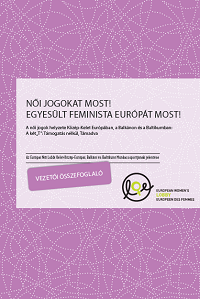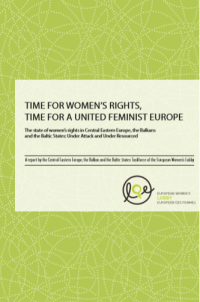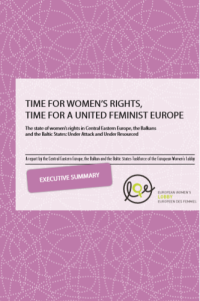The time is now for a Feminist Europe
NEW report on the state of women’s rights in Central Eastern Europe, the Balkans and the Baltic States

[Brussels, 16 December 2018] Writer and women’s rights activist, Elif Shafak: ‘It’s a crucial moment for global feminism. (…) We women sometimes play a role in the continuity of patriarchy, because patriarchy is not a black and white system in which men oppress women. It’s much more complicated. I think we need to go back to the basics. Remember the solidarity. The sisterhood. And expand it.”
The women of Central and Eastern Europe are telling their stories. The story they tell is one of the women of their region yesterday, today and tomorrow. Over time, they have been given false podiums, false hope, they have been wrestled with, told to go to work, told to stay home from work, disappeared, written out of history. But now they are telling this story with a view to rewriting it, and it has just been published in our new report!
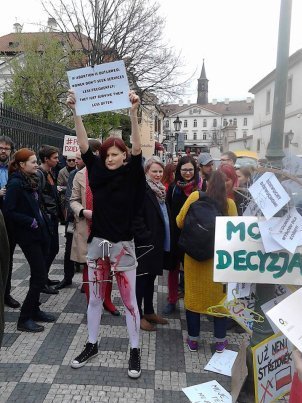
- Solidarity protest against the abortion ban in Poland in Prague
This EWL report tells of the failures of the past in the region – from the state of women’s emancipation upheld by socialist authoritarian states to the transition time backlash against all things feminist in the 90s, which called for a restoration of “proper, traditional gender relations”. From the market liberalisation fever that slashed women’s jobs and services to EU accession and EU funding that remained a dream for most of the smaller women’s rights organisations. And to conservative populist politics in many countries, introducing laws bringing restrictions on abortion and contraception. As Taskforce member Borbála Juhász points out: "If family policy is pitted against women’s rights, we will lose both". Women’s rights and gender equality have been reduced to footnote status on the list of EU priorities.
If there is one red thread throughout the modern history of the region, it is that neither the gender equality and women’s rights agenda nor the movement behind it ever had any genuine support or space to transform themselves and to transform society. And yet it’s not all dark. The solutions are there and they are being proposed by women who have decades of experience of transformative thinking at the grassroots of societies from Serbia to Hungary, Poland and Estonia.
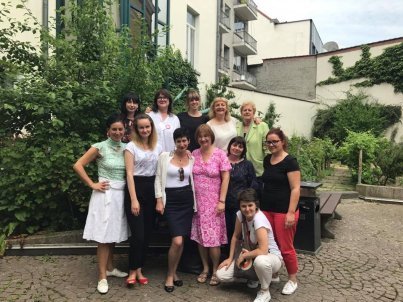
- Members of the EWL CEEBBS Taskforce in Brussels in June 2017
They have a vision which is context specific, but in fact largely relevant for the whole EU. What if decision makers – local to national to EU level – understood that feminism means well-being, sustainability, inclusion and justice for all? What if they started to really give space and support to women’s rights organisations? What if there was no parliament and no government with less than 50% women? Task Force member Kateřina Hodická from the Czech Republic added: "Though women gained the right to vote in Czechoslovakia already in 1919, still 100 years later Czech women do not cherish equality de facto with Czech men. E.g. gender pay gap reaches 22 %." What if the ‘gender pay gap’ was a thing of the past? What if the home was no longer the most dangerous place for a woman to be? What if domestic violence was universally considered as a crime? What if migrant and minority women were valued as women with full rights as well as a wealth of knowledge, expertise and experience that they are willing to share with Europe?
All of these solutions are within reach. What if …we made them a reality? The time is now for a feminist Europe.
Find the report by EWL’s Central Eastern Europe, the Balkan and the Baltic States (CEEBBS) Taskforce report here and the Executive Summary here. The Executive Summary is also available in Hungarian here, thanks to our member the Hungarian Women’s Lobby.
